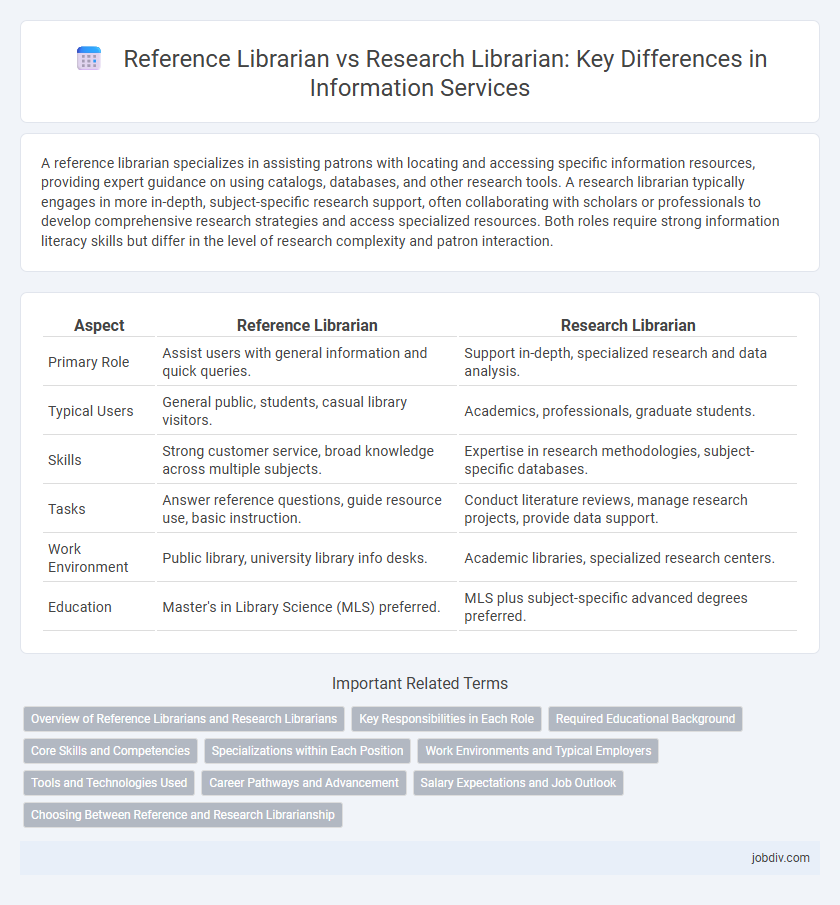A reference librarian specializes in assisting patrons with locating and accessing specific information resources, providing expert guidance on using catalogs, databases, and other research tools. A research librarian typically engages in more in-depth, subject-specific research support, often collaborating with scholars or professionals to develop comprehensive research strategies and access specialized resources. Both roles require strong information literacy skills but differ in the level of research complexity and patron interaction.
Table of Comparison
| Aspect | Reference Librarian | Research Librarian |
|---|---|---|
| Primary Role | Assist users with general information and quick queries. | Support in-depth, specialized research and data analysis. |
| Typical Users | General public, students, casual library visitors. | Academics, professionals, graduate students. |
| Skills | Strong customer service, broad knowledge across multiple subjects. | Expertise in research methodologies, subject-specific databases. |
| Tasks | Answer reference questions, guide resource use, basic instruction. | Conduct literature reviews, manage research projects, provide data support. |
| Work Environment | Public library, university library info desks. | Academic libraries, specialized research centers. |
| Education | Master's in Library Science (MLS) preferred. | MLS plus subject-specific advanced degrees preferred. |
Overview of Reference Librarians and Research Librarians
Reference librarians assist patrons by providing direct answers to inquiries and guiding efficient use of library resources, specializing in information retrieval and user support. Research librarians focus on comprehensive research processes, aiding in in-depth data collection, analysis, and access to specialized academic or technical materials. Both roles emphasize expertise in information management but differ in scope, with reference librarians addressing immediate informational needs and research librarians supporting extensive, scholarly investigations.
Key Responsibilities in Each Role
Reference librarians specialize in assisting patrons with locating specific information, answering queries, and providing guidance on the use of library resources. Research librarians focus on conducting in-depth research, curating specialized collections, and supporting academics or professionals with comprehensive data analysis. Both roles require expertise in information retrieval and resource management but differ in the scope and depth of their key responsibilities.
Required Educational Background
Reference librarians typically require a Master of Library Science (MLS) or Master of Library and Information Science (MLIS) degree with specialized training in information services and public interaction. Research librarians often hold an MLS or MLIS degree combined with subject-specific expertise or advanced degrees in fields like history, science, or law to support in-depth academic or professional research. Both roles demand strong information literacy skills, but research librarians usually need more extensive knowledge of research methodologies and database management.
Core Skills and Competencies
Reference librarians excel in information retrieval, user interaction, and resource evaluation, specializing in guiding patrons through reference materials and digital databases. Research librarians possess strong analytical skills, subject expertise, and data management capabilities, often assisting with complex research projects and scholarly communication. Both roles require proficiency in information technology, critical thinking, and effective communication to support diverse patron needs.
Specializations within Each Position
Reference librarians specialize in assisting patrons with locating specific information, utilizing expertise in databases, catalogs, and information retrieval techniques tailored to various subjects. Research librarians focus on in-depth investigation and analysis, often supporting academic or professional projects by gathering, evaluating, and synthesizing complex resources within specialized fields such as law, medicine, or social sciences. Both roles require strong subject knowledge, but reference librarians typically engage in direct patron services, while research librarians concentrate on advanced research methodologies and resource management.
Work Environments and Typical Employers
Reference librarians commonly work in public libraries, academic libraries, and specialized research centers, providing direct assistance to patrons seeking information. Research librarians are often employed by universities, government agencies, corporations, and think tanks, focusing on in-depth data analysis and support for complex research projects. Both roles require collaboration with faculty, researchers, or the general public, but research librarians typically operate in more specialized or institutional settings with access to extensive databases and archival materials.
Tools and Technologies Used
Reference librarians primarily utilize integrated library systems (ILS), online databases, and digital catalogs while assisting patrons with information retrieval and resource access. Research librarians leverage specialized research tools such as citation management software, data analysis platforms, and subject-specific databases to support in-depth academic or scientific inquiries. Both roles increasingly adopt artificial intelligence-driven search engines and virtual reference services to enhance information discovery and user engagement.
Career Pathways and Advancement
Reference librarians typically focus on assisting patrons with immediate information needs, developing expertise in specific subject areas, and often pursue career advancement through roles like specialized subject librarians or library directors. Research librarians engage deeply with research methodologies, support academic or professional research projects, and may advance to positions such as research coordinators, scholarly communication specialists, or academic faculty roles. Both careers require ongoing education and skill development, with research librarians often holding advanced degrees to facilitate higher-level research support and leadership opportunities.
Salary Expectations and Job Outlook
Research librarians typically earn higher salaries than reference librarians, with median wages ranging from $60,000 to $75,000 annually, depending on specialization and experience. Job outlook for both professions is projected to grow around 5% through 2031, reflecting steady demand in academic, corporate, and public sectors. Advanced degrees and research skills enhance salary potential and career advancement opportunities within research librarian roles.
Choosing Between Reference and Research Librarianship
Choosing between reference and research librarianship depends on the nature of information services needed; reference librarians specialize in immediate, general inquiries and user guidance, while research librarians focus on deep, subject-specific research support and information analysis. Reference librarians facilitate quick access to resources and help users navigate library systems, whereas research librarians design complex research strategies and manage specialized collections. Understanding the distinctions aids in selecting the appropriate librarian role tailored to specific informational goals and user demands.
Reference Librarian vs Research Librarian Infographic

 jobdiv.com
jobdiv.com